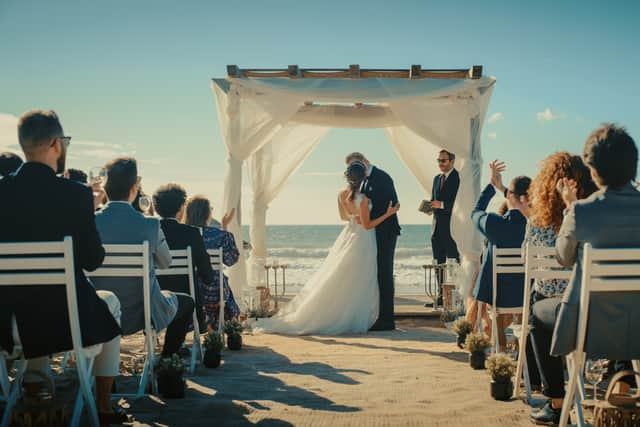Wedding laws in England and Wales need huge overhaul so couples can marry where they want, Law Commission says
and live on Freeview channel 276
Couples could soon be able to marry on beaches, in gardens and on cruise ships under new proposals to overhaul current rules on where weddings can be held.
Existing wedding laws have been branded as “stuck in time” and do not work for most couples, according to the Law Commission, which advises the government on law reform.
Advertisement
Hide AdAdvertisement
Hide AdThe Law Commission is now proposing to tear up the current restrictions and recommend that weddings should be able to take place anywhere, in what would be the biggest overhaul to marriage regulations in England and Wales since the 19th century.
It says that “needless regulation” prevents couples from marrying in a place that is special to them, or having a ceremony that reflects their wishes and beliefs.
As a result, it warns many couples are choosing to celebrate in a way the law does not recognise, with some marrying abroad and others paying for two ceremonies – one that complies with the law and one that aligns with their personal values.


What would the changes mean?
Under current laws, couples must choose between a civil or religious ceremony and hold their wedding in a registered building, with different rules in place among religious groups and for civil services.
Advertisement
Hide AdAdvertisement
Hide AdThe Law Commission is proposing that weddings should instead be able to take place in “any safe and dignified location”. This could include family homes, gardens, beaches, forests, parks, village halls and cruise ships.
The officiant, not the location, would be regulated, and couples would have more freedom to personalise the content of their ceremony.
Under the proposed changes, couples would be able to wed in “smaller and cheaper” venues following increasing demand for more affordable, personal options, particularly as the cost-of-living crisis and the ‘Covid backlog’ of weddings persist.
A set of universal rules would apply across religious and civil weddings, with few exceptions, enabling fairer treatment for all beliefs. This could include legalising non-religious belief ceremonies, such as humanist weddings, if permitted by the government.
Advertisement
Hide AdAdvertisement
Hide AdIt also recommends that special measures should be taken in the event of a national emergency, such as the coronavirus pandemic, which prevents couples from complying with requirements, such as allowing witnesses to attend weddings remotely.
The Law Commission says it intends to offer couples more freedom while also preserving the dignity of weddings and protecting traditions of religious groups.
It adds that the proposals would also enhance protections against forced and predatory marriage, and maintain protection against sham marriages.
Professor Nick Hopkins, family law Commissioner at the Law Commission, said: “The current law on weddings is not working for many couples. Needless restrictions and outdated regulations mean that thousands each year are denied having a wedding that is meaningful to them.
Advertisement
Hide AdAdvertisement
Hide Ad“Our reforms for government are designed to protect the established practices and dignity of weddings, while offering couples more choice on where and how they marry. There is widespread precedent for our reforms around the world.
“By giving couples more control over their weddings and ensuring greater parity for all beliefs, the law can support those who want to get married, rather than putting unnecessary barriers in the way.”
When could the proposals take effect?
Humanists UK said the proposals would take some years to implement if accepted by the government.
However, it said the government could give legal recognition to humanist weddings through secondary legislation immediately.
Advertisement
Hide AdAdvertisement
Hide AdHumanists UK chief executive Andrew Copson said: “We urge the Government to enact this now, and give couples in England and Wales the freedom to choose a marriage that aligns with their beliefs and values.
“For thousands of couples it is hugely frustrating that something as uncontroversial as legal recognition for humanist marriages has been delayed for almost a decade.”
A Ministry of Justice spokeswoman added: “We asked the Law Commission to review our current marriage laws to ensure this important institution continues to reflect modern society.
“We will carefully review these recommendations and respond in due course.”
Comment Guidelines
National World encourages reader discussion on our stories. User feedback, insights and back-and-forth exchanges add a rich layer of context to reporting. Please review our Community Guidelines before commenting.
